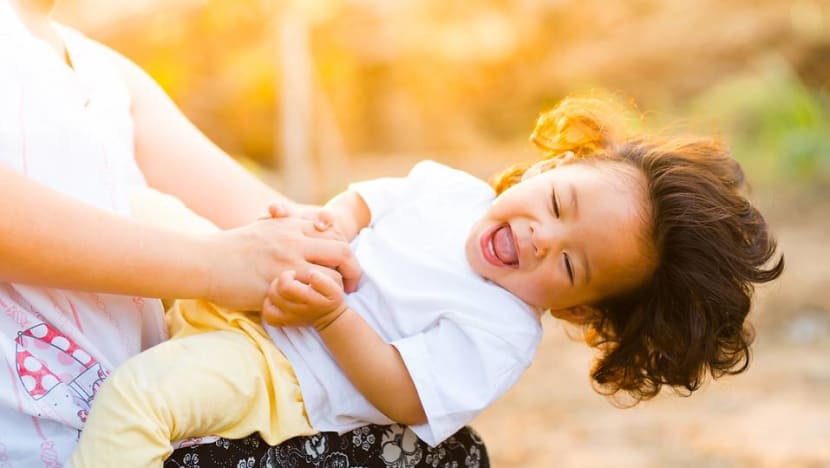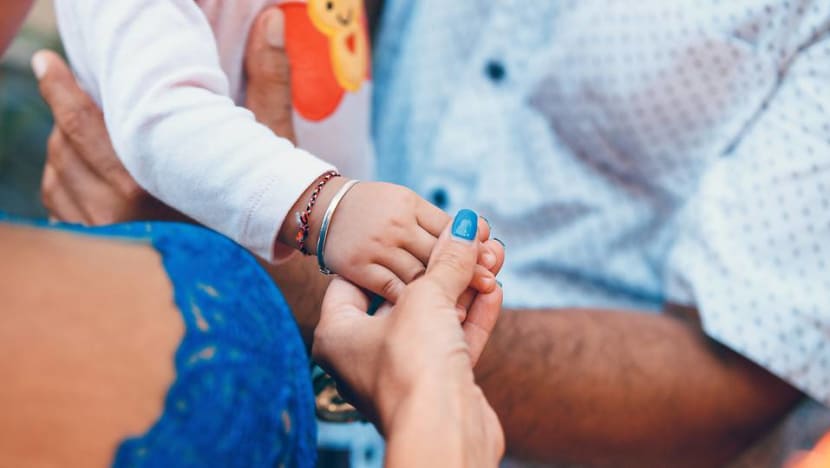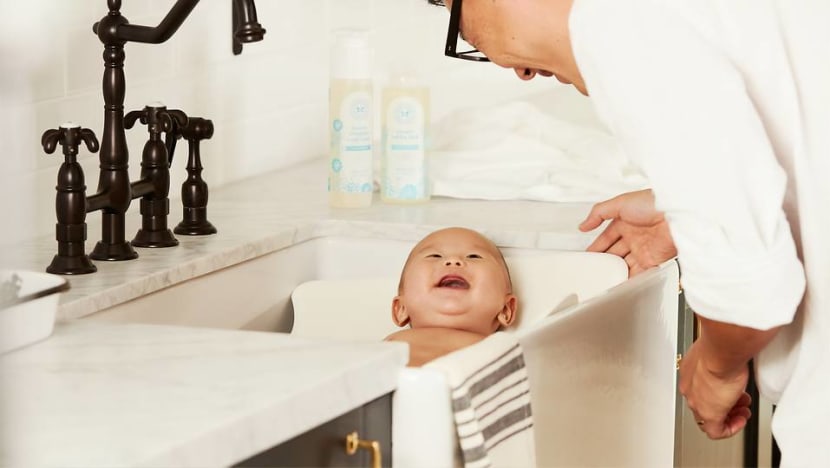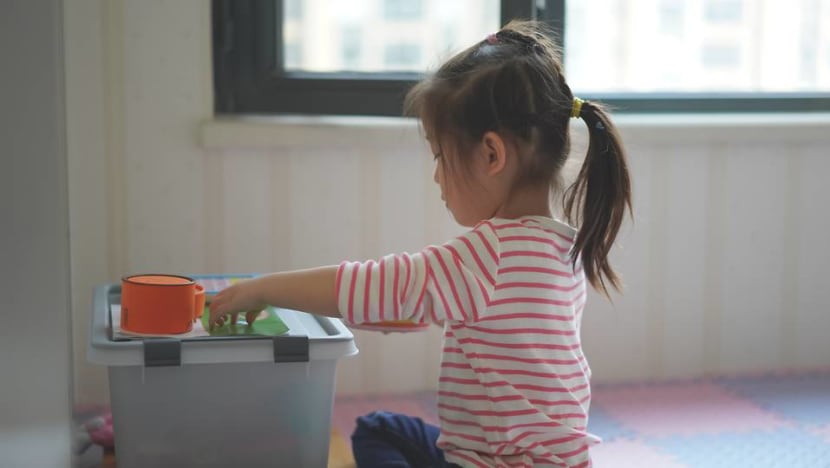commentary Commentary
Commentary: Am I a bad mum for leaving my kid in childcare while returning to work?
Research shows modern caregiving arrangements does not adversely impact child development in the way we think it does, says Children’s Society Lin Xiaoling.

(Photo: Pexels/Singkham)
SINGAPORE: It was with mixed feelings when I sent my son to infant care more than three years ago. My four months maternity leave was ending, and I was about to head back to work.
My parents and in-laws were getting on in their years. My husband and I were uncomfortable to leave our baby with a domestic helper, so the infant care centre was our next best bet.
When I explained this decision to relatives, friends and colleagues, they too, had mixed responses. Fellow working mothers understood where I was coming from, but others (I could tell from the way their faces scrunched up, however slightly) felt much pity for my baby son.
They were well-meaning, but their reactions made me doubt the soundness of my decision. Was I being a bad mother by choosing work over caring for my baby? And worse, sending my boy to infant care instead of arranging for a one-on-one care, preferably by grandparents?
How would this impact my son’s development? These questions that once weighed heavily on my mind are probably still common conundrums that working mothers with young children face.
READ: Commentary: Parental warning - these May school holidays will be like no other
NO ‘BEST’ CAREGIVING ARRANGEMENT
More than a decade ago, the Singapore Children’s Society began a collaboration with the KK Women’s and Children’s Hospital to conduct a longitudinal research study on infant attachment, the first done locally.
The goal was to understand caregiving arrangements among families with young children in Singapore, and if children’s temperament and developmental outcomes would be affected by these.
A total of 439 first-time mothers participated, with most working full-time, lived in 4-or 5-room HDB flats, and had completed diplomas or degrees.
The study found that children’s primary caregivers changed over time. At four months, mothers were the primary caregivers for most of the children. At 18 months, grandmothers were the primary caregivers for most, and by three years of age, most children were in the care of a grandparent or were enrolled in a child care centre.
On average, children in the study had two changes in caregivers by age three.

These changes in caregivers can be largely attributed to our parenthood policies.
Mothers tended to be their baby’s main caregiver in the first four months of maternity leave. When they returned to work, mothers sought a trustworthy figure to care for their baby. Oftentimes, this person was the baby’s grandmother, if she was available to help.
As the child grew older, many mothers placed their child in childcare centres, recognising the need for him to be socially and cognitively stimulated.
Overall, mothers’ caregiving choices appeared to be guided by both practical considerations and perceptions of their child’s evolving needs.
The study also found children’s developmental outcomes were not directly associated with the type of caregiver they had. In other words, there is no one “best” caregiving type.
READ: Commentary: Confinement without help during COVID-19 – Mums, you're stronger than you know
READ: READ: Commentary: If mums are amazing, why do some workplaces discriminate against pregnant women?
However, babies with a closer bond with their mothers tended to manage their feelings better and had better social-emotional skills.
What this means is it is more important to forge a strong mother-child bond rather than worry about mothers themselves not being the main caregivers, or how the caregiving arrangement affects child outcomes.
As all the participants in this study were mothers, only the mother-child bond was measured. Nevertheless, this does not undermine the effects of a strong father-child relationship, which has proven to be beneficial to children in other studies.
READ: Commentary: COVID-19 is giving dads more opportunities to be involved at home
WHAT WORKING MUMS BRING TO THE TABLE
Interestingly, this study also found children whose mothers worked full-time in the first three years of their lives had better social-emotional skills than their peers whose mothers were not.
Such advantages might have stemmed from these children interacting with more people, as they had a variety of caregivers or were placed in childcare, while their mothers worked. Previous studies have also found that social interactions helped infants understand their social environment and guide their responses.

In contrast, a handful of the non-working mothers in this study performed their caregiving role all by themselves throughout their child’s first three years.
It is possible they lacked the social support or help from another caregiver, and they might not have any time off at all. These could have potentially impacted their children’s social-emotional development.
It is not rocket science that the well-being of mothers is extremely important to children’s development. As research studies continue to inform us about the nuances of child development and parent-child relationship, we must periodically challenge our long-held assumptions, for example, that parental care leads to better developmental outcomes.
With new knowledge and understanding, we should also consider what changes can be made to better support mothers to make the best out of the choices they make given their unique family circumstances.
READ: Commentary: COVID-19 has made me rethink household chores and cleaning
READ: Commentary: How helping at home benefited my wife, our children and even me
For working mothers, such support can come in the form of increased parental care leave and more flexible workplace arrangements that enable them to better juggle their careers and maternal role.
As we see more fathers playing an active part in childrearing, allowing fathers some access to more of such schemes can lift part of the caregiving burden off mothers.
We also must not neglect mothers who are single-handedly caring for their children as it had been shown that there could be possible repercussions on the child’s outcomes when these mothers do not have adequate support.
LISTEN: Home-based learning: Good, bad, terrible ... but mostly good?
LISTEN: Why lifting lockdowns and easing restrictions may be the biggest COVID-19 test facing countries
NO NEED FOR MUM GUILT
The late Dr John Elliott, an academic with a deep interest in the social and cognitive development of young children, made the point that there is no single best or only way to rear children at the 13th Singapore Children’s Society Lecture.

He reiterated that Singaporean parents need a bit more confidence that they are the best judges of what is best in their own families. He also pointed to research studies suggesting working mothers are not risk factors for problems with children:
Happy mothers who are happy because they are working and pursuing their careers are better mothers than unhappy mothers who have given up their careers to spend all their time with their children.
To all working mothers who had chosen your career over the main caregiving of your babies, take heart that so long as you spend time to build a relationship and bond with your children, they will grow up fine.
There’s no need for mum guilt.
Lin Xiaoling is Group Lead, Advocacy and Research at Singapore Children's Society.














